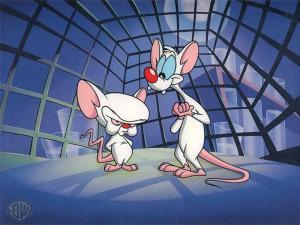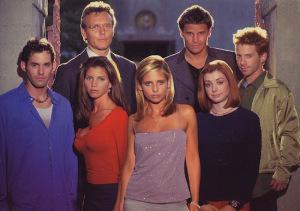Spielberg’s credits are so vast we had to split this into two different parts. Look for Part 2 on Sunday (5/26) morning to coincide with the final two episodes of the Spielberg-produced show Smash.
In my youth, I was always especially overjoyed by the pop culture-skewering adventures detailed in the animated series Steven Spielberg Presents Pinky and the Brain. I am still delighted to this day by even the mere sight of the characters or any utterance of the theme song’s opening dialog of “Gee, Brain. What do you want to do tonight??/”The same thing we do every night, Pinky. Try to take over the world!”

The plots to take over the world usually ended up in scenarios which parodied popular film/TV, politics, and social trends.
Of course, when I was a kid I had no idea why Spielberg’s name was in the title. Nor did I know why his name was in the title for similar Warner Bros. animated shows Tiny Toon Adventures, Animaniacs, and Freakazoid! I just knew I liked the cartoons and mostly ignored Spielberg’s name. However, in the time since then it seems like every other year there is some new TV show announced as coming from Executive Producer Steven Spielberg as if that distinction means something. The latest such announcement came three days ago when Microsoft announced Spielberg was executive producing a live-action TV show adaptation of the video game franchise Halo.
However, here I am all these years later, and I still don’t fully understand what the heck it really means when a known name is announced as an Executive Producer of something. I often assume it simply means that person is lending their name to a project to give it credibility without actually doing much more than that. As it turns out, my cynical assumption is incorrect – well, for the most part.
What Does An Executive Producer Do?
The Producers Guild of America (PGA) offers the following guidance for determining who qualifies to be called an Executive Producer (EP) of a televisions show:

- The credit of Executive Producer is to be granted to the individual whose only reporting responsibility is to the entities financing and distributing the series.
- The Executive Producer has final responsibility for the creative and business aspects of the production of the series, with direct participation in making decisions concerning a majority of the producing functions.
So, the EP is the boss. What exactly do they do, though? Well, the PGA says an EP is required to supervise all story/script meetings, approve all storylines, select/approve the casting of all actors and hiring of all directors, editors and key members of the production team, view the dailies during filming, and approve the final cut of every episode. Moreover, the EP is normally called upon to speak on behalf of the show in promotional material.
That sounds horribly impressive. However, if this person is the boss then why is it that some shows have a small army of credited EPs? And aren’t there plenty of horror stories about people credited as an EP even though they did next to nothing?
Yes, it is true that that there are often multiple EPs. In such a situation, there is still a chain of command, and the one in charge and to whom the other EPs report is usually given the informal designation of showrunner. As for why some people earn an EP credit without active involvement in a show, this appears to be a by-product of a well-meaning PGA by-law:
“Frequently, the Executive Producer is responsible for the creation of the series […] In this special circumstance, the PGA gives considerable weight to such a seminal contribution, and supports the Executive Producer credit for such creators who remain engaged with the series in an ongoing supervisory capacity.”
What exactly constitutes “supervisory capacity” is not entirely clear. In the intent of the law, people like Dan Harmon and Eric Kripke who operated as showrunners for shows they created (Community and Supernatural respectively) continue to receive EP credit long after they’ve moved on to other projects. However, it seems one need not have ever even been that involved. If they were involved with assisting on the creation end of the show before handing off day-to-day operations to others then they will get an EP credit. Plus, an EP credit can be contractually mandated for any and all future projects using that some intellectual property even if the person receiving the credit has absolutely nothing to do with the project anymore.

Just ask Fran Rubel Kuzui and Kaz Kuzui and their EP credit on every single episode of the Buffy the Vampire Slayer TV show and its spin-off Angel even though their only active involvement was with the Buffy movie that came before the shows
How Often Does Spielberg Do This Kind of Thing?
A lot. As in, I’ve lost count, but we’re nearing the mid to late 20s on number of EP credits for him in TV shows. Granted, Spielberg has been the President of Amblin Entertainment, a production studio he-cofounded, since 1981, and he was a co-founder and one-third owner of the independent film studio DreamWorks Studios from 1994 to 2005. As such, his name ends up on a lot of things, film and television, and that’s not even counting the things he actually directs. However, it is often his name and industry clout which gets projects off of the ground, and although he’s never really been a showrunner he appears to be more than a simple figurehead.
On the TV side of the spectrum, Spielberg’s career as producer began with the sci-fi anthology series Amazing Stories in 1985, which he created and served as the EP. The show was canceled by NBC after two seasons. Appropriately enough, his longtime composer John Williams composed the show’s theme song:
It was in animation where Spielberg would enjoy his first true success. After he produced the animated film An American Tail, Warner Bros. Animation approached him in 1987 about maybe doing a project involving junior versions of Looney Tunes characters. This turned into Tiny Toon Adventures, which Spielberg co-created (along with Jean MacCurdy and Tom Ruegger), executive producer, and lent his name to the title (as discussed earlier). The show ran for five seasons between 1990 and 1995.
This was followed up throughout the 90s by the aforementioned Animaniacs, Pinky and the Brain, Freakazoid! as well as lesser-known, short-lived spin-offs The Plucky Duck Show and Pinky, Elmyra & The Brain. But, again, his name is in the official title for each show, but what did he actually do? Well, in a special feature from the season 1 box set of Pinky and the Brain legendary voice acting casting director Andrea Romano had this say:
“[Spielberg[ had story ideas he would pitch to us. He’d read the storyboards. He’d approve things. He really was involved. He loved it.”
One of the show’s writer/producers Peter Hastings added this:
“I’ve been told that at Amblin at that time that anything else that was supposed to go through Spielberg, movie or tv show, would go through this chain of people, but the cartoon stuff went right to him. He was in Poland shooting Schindler’s List, and he’d finish his shooting day and he’d have some satellite hook-up where he could listen to the music for Jurassic Park that John Williams was scoring and then he’d watch the cartoon tapes.”
Hastings also describes going in to pitch story ideas to Spielberg with the idea written on a sheet of paper only to walk out with a folder full of paper because of all the ideas Spielberg had suggested. So, Spielberg appears to have been very involved with the cartoons.
However, at the same time that Tiny Toon Adventures and Animaniacs were doing well Spielberg was making waves in 1993 with his live action science fiction series seaQuest DSV.
I remember how big of a deal this show was supposed to be. Steven Spielberg was executive producing it. Teen heartthrob Jonathan Brandis was in it as was Roy Scheider. NBC promoted the hell out of it. The promotion worked because the show was initially a hit, but it lost viewers relatively quickly and by its third season it had even lost Spielberg. It was canceled midway into its third season, at which point the show had a mostly new cast with a different name thus was the level of behind the scenes turmoil on the project.
Spielberg’s name was also attached to ER in 1994. However, Spielberg actually had rather little to do with it. Michael Crichton had written a feature film script about his experiences working in a Boston area emergency room, and Spielberg wanted to direct it. The script was kicked around for years, but eventually Crichton and Spielberg pitched it to NBC where it morphed from a movie into a TV show. John Wells joined the project, and worked with Crichton on massively re-worked the script (for example, diversifying the entirely white male cast). They gave Spielberg an EP credit for a while, but he eventually removed his own name from the show.
According to Warren Littlefield’s Top of the Rock: The Rise and Fall of Must-See TV, when Spielberg was asked early on to direct an episode of ER, he indicated he had no idea how he could possibly improve upon the work already being done on the show.
Spielberg had ahead of him a great many Emmy Award-winning mini series across the next decade before experiencing a run of high profile failures (Terra Nova! The River! Smash! Oh, my) in the 2010s. Look for discussion of that in part 2, coming soon.
What do you think so far?

